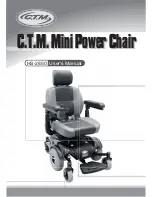
1-3
ZRA_Aero Z Owner’s Manual
OM_ZRA_Aero Z_0913RevA
CHAPTER 1: WARNINGS
I. MOTOR VEHICLE SAFETY
I
WARNING
TiLite wheelchairs are NOT designed to be used for seating in a motor vehicle, and TiLite wheelchairs do NOT meet
Federal standards for motor vehicle seating.
1. NEVER sit in your chair while in any type of moving vehicle (bus, automobile, van, truck, boat, train, etc.). In an
accident or sudden stop, you may be thrown from the chair. In an accident or sudden stop, a wheelchair seat belt
will NOT prevent injuries and may, in fact, cause injuries.
2. ALWAYS transfer to an approved vehicle seat before the vehicle begins moving.
3. ALWAYS secure yourself in the approved vehicle seat using the proper seating restraints (in a motor vehicle, lap/
shoulder belts; in a plane, lap belts, etc.).
4. NEVER transport your chair in the front seat of a vehicle. Movements of the vehicle may cause the chair to shift
and interfere with the driver’s ability to control the vehicle.
5. When transporting your chair in a moving vehicle, ALWAYS secure your chair so that it cannot roll or shift. In most
cases, stowing it in the trunk is the safest alternative.
6. NEVER use any chair that has been involved in a motor vehicle accident. A wheelchair that has been involved in
a motor vehicle accident may be damaged in ways that are not readily apparent and which could cause the chair
to fail in use.
If you ignore these Warnings, you may fall, tip over or lose control of the wheelchair and seriously injure yourself or
others or damage the wheelchair.
J. WEIGHT TRAINING
I
WARNING
NEVER use your TiLite wheelchair for weight training. When your chair was set up with the assistance of your health
care advisor, your center of gravity was determined based on your weight, the configuration of your chair and your
abilities. If you engage in weight training activities in your chair, you are altering the total weight supported by your
chair and the distribution of that weight. The center of gravity of your chair may not be appropriate with the additional
weight or with the different distribution of weight, which may cause the chair to tip over. The additional weight
could exceed the weight limit for the chair and damage the chair. If you intend to engage in weight training, TiLite
recommends that you utilize weight training equipment with built-in seating and that you transfer to that seating rather
than using your chair.
If you ignore these Warnings, you may fall, tip over or lose control of the wheelchair and seriously injure yourself or
others or damage the wheelchair.
K. OBTAINING ASSISTANCE
I
WARNING
For The Wheelchair User:
ALWAYS make sure that each person who assists you reads and understands this entire Manual, especially the
Warnings in Chapter 1.
For Attendants/Assistants:
1. ALWAYS work with the user’s health care advisor to learn safe methods to assist the wheelchair user and to
determine which methods are best suited to your abilities and those of the user.
2. ALWAYS communicate to the user what you plan to do before you do it and explain what you expect the user
to do while you are taking such action. This will put the user at ease and reduce the risk of an accident due to a
miscommunication.
3. ALWAYS use good posture and proper body mechanics in order to avoid injury to your back.
4. When you lift or support the user or tilt the chair, ALWAYS bend your knees slightly and keep your back as upright
and straight as you can.
5. Wheelchair push handles are designed to provide a secure location for an attendant to grip the rear of the
wheelchair to prevent a fall or tip-over. ALWAYS make sure the wheelchair has push handles and ALWAYS use
them. REGULARLY check to make sure the push handle grips are securely seated on the back canes so they will
not rotate or slip off.
















































